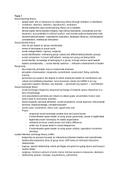Topic 1
Social learning theory
- people learn info or behaviour by observing others through inhibition or dishibition
- conditions: attention, retention, reproduction, motivation
- ethical leadership uses social learning theory as a mediator
- ethical leader demonstrates integrity, high ethical standards, considerate and fair
treatment, accountability for ethical conduct, and transformational leadership traits
- transformational leader: inspirational motivation, idealized influence, individualized
consideration, intellectual stimulation
Social identity theory
- who we are based on group membership
- sense of belonging to social world
- social categorization: ingroup, outgroup
- social identification: embracing group values and differentiating between groups
- social comparison: to boost self-esteem, seeing own group as being better
- social identity: knowledge of belonging to a group, through actions aand beliefs
- leaders prototipicality → social identity salience → followers endorsement of leader
Reciprocity
- the reciprocity principle: duty to reciprocate kindness
- principles of persuasion: reciprocity, commitment, social proof, liking, authority,
scarcity
- perceived org support: the degree to which employee beliefs its contributions are
valued and wellbeing important, socio-economic needs are fulfillef in an org
- supervisor support, fairness, org rewards → perceived org support → commitment
Social exchange theory
- social exchange shaped by reciprocal exchange of rewards (every interaction is a
form of exchange)
- core assumptions:activities are means to obtain goals, all activities involve cost,
actors seek to economise activities
- Social rewards: personal attraction, social acceptance, social approval, instrumental
services, respect/prestige, compliance/power
- social costs: investremnt, direct cost, opportunity cost
- Power
- reciprocal social exchange creates trust and social bonds
- if subordinates agree leader is using power generously, power is legitimated
- legitimate power necessary for stable organisation
- unilateral services create power and status difference
- unfair use of power leads to social disapproval
- if subordinates agree leader is using power unfairly, opposition movement
develops
Leader Member exchange theory (LMX)
- leadership as process focused on interactions between leaders and subordinates
- traditionally leadership done at group level, LMX looks at individual interactive
relationships
- ingroup: special relationship where privileges are given for going above and beyond
routine duties
- outgroup: minimum amount of work, hence minimal access to resources, decisions
- relationship phases: stranger, acquaintance, partnership
, - supervisor trust and reciprocal behaviour → LMX → more in-,extra-role behaviour
Self-efficacy
- personal judgement of how well can one execute course of action required to deal
with prospective situations
- Is effected by: performance outcomes (experience), vicarious experiences (others),
verbal persuasion (encouragement), physiological feedback (physical sensation)
- People avoid tasks where self-efficacy is low and seek out tasks where self-efficacy
is high.
- When self-efficacy is too far above ability, people set themselves up for failures.
- When self-efficacy is too far below ability, people don’t learn and develop.
- Optimal level is a little above ability – encourages striving with opportunities for
success
Learned Helplesness/Optimism
Psychological safety
- safety: comfort admitting mistakes → learning from failure → everyone openly shares
ideas → better innovation and decision making
- danger: fear of admitting mistakes → blaming others → less likely to share different
views → common knowledge effect
Topic 2
Motivation
- psychological process that directs, energizes and maintain action towards goal
- work centrality: to work
- work engagement: to work hard
- anticipation of positive future state is energizing
- Universal motives: need fulfillment (maslow), intrinsic motivation, justice motives
- Trait based motives: achievement, power, personality, motivation orientation
- Context based motives: social, task and job
- Process based: goal choice, goal striving
Goal setting theory
- conscious goals affect action
- SMART difficult goals to enhance focus and effort
- moderators: commitment, feedback, task complexity (proximal, learning, creative)
Proactive motivation theory
- setting proactive goal and achieving it
- proactivity is self starting, change oriented and future focused
- generation of proactive goal: envisioning, planning, changing self or situation
Self Determination theory
- needs need to be satisfied to achieve intrinsic motivation
- needs: autonomy, competence, relatedness
- intrinsic vs extrinsic motivation
Procrastination
- failure to act on intended important tasks in timely manner
- avoidance of implementation of intention
Topic 3
Human capital theory
- knowledge skills (general or company specific) and abilities and others (KSAOs) of
people within company
- individuals and orgs derive economic benefits from KSAOs




